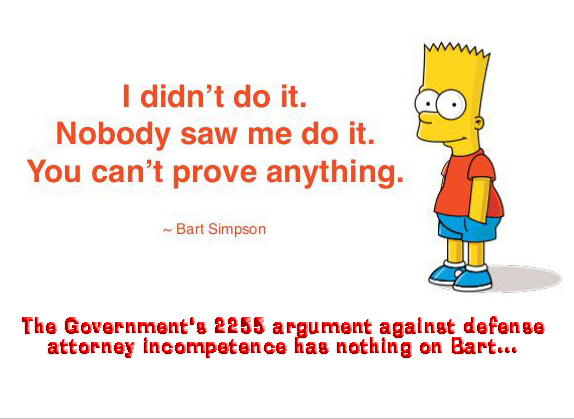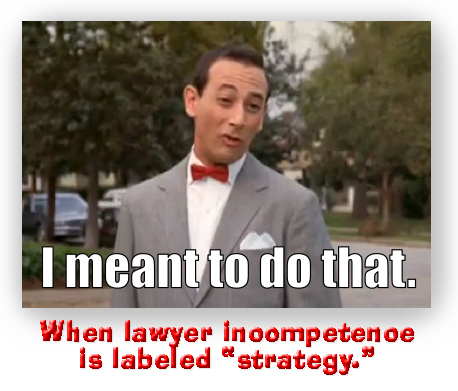We post news and comment on federal criminal justice issues, focused primarily on trial and post-conviction matters, legislative initiatives, and sentencing issues.

3RD CIRCUIT HOLDS THAT COLORABLE 2255 CLAIMS DEMAND A HEARING
 Venue isn’t a very big deal in federal civil cases. But venue in a criminal trial – the right to be tried “in the state and district wherein the crime shall have been committed” – is a 6th Amendment requirement so basic that it has its own jargon: vicinage.
Venue isn’t a very big deal in federal civil cases. But venue in a criminal trial – the right to be tried “in the state and district wherein the crime shall have been committed” – is a 6th Amendment requirement so basic that it has its own jargon: vicinage.
And that makes sense. Just ask Aaron Burr. He got hauled all the way from Louisiana to stand trial in Richmond, Virginia, far from where the offense occurred and witnesses were located.
Even now, criminal venue can get short shrift. I once had a Philadelphia lawyer – who had just left the U.S. Attorney’s office – tell me over coffee that lack of venue in an indictment was no big deal because the issue was easily waived and hardly mattered anyway.
He was wrong.
Dave and Judy Haisten ran a diversified business, selling misbranded pesticides and animal drugs, as well as a variety of counterfeit goods (which included DVDs). They sold some of the pesticides in the Eastern District of Pennsylvania. The DVDs, however, were seized by customs officials in Cincinnati en route to the Haistens’ South Carolina home.
Dave and Judy were convicted in the Eastern District of Pennsylvania on 14 charges, including two counts of trafficking in counterfeit DVDs. They each got 12 months’ concurrent imprisonment on the first twelve counts (relating to pesticides and animal drugs). However, Dave got 78 months on the two DVD counts, concurrent with the other 12 counts (for a total sentence of 78 months). Judy got 60 months on her DVD counts, all running concurrently.
The Haistens believed that where the DVDs were concerned, they were strangers to the Eastern District of Pennsylvania. They argued that venue for the DVD counts only existed in Ohio – where the shipment was intercepted – or South Carolina, where they kept their stash of counterfeit DVDs. But their trial attorney did not request a jury instruction on improper venue or move for acquittal on the DVD counts for lack of proper venue in the Eastern District of Pennsylvania.
 The Haistens ultimately filed a joint § 2255 motion, arguing that their lawyer had been ineffective for failing to challenge venue on the DVD counts. The U.S. Attorney’s opposition to their § 2255 motion followed the typical government script: (1) the lawyer did not screw up; (2) the lawyer’s screw-up was done for strategic reasons; and (3) the lawyer’s screw-up did not prejudice the defendants.
The Haistens ultimately filed a joint § 2255 motion, arguing that their lawyer had been ineffective for failing to challenge venue on the DVD counts. The U.S. Attorney’s opposition to their § 2255 motion followed the typical government script: (1) the lawyer did not screw up; (2) the lawyer’s screw-up was done for strategic reasons; and (3) the lawyer’s screw-up did not prejudice the defendants.
The District Court denied Dave and Judy’s § 2255 motion, holding that any venue argument by their lawyer would have been futile because the government had proved venue for the DVD counts, based on a spreadsheet offered by the government that showed the Haistens had sent five DVDs to customers in the Eastern District of Pennsylvania. Neither the government nor the district court obtained a declaration from the Haistens’ lawyer as to why he did not argue venue.
Last week, the 3rd Circuit reversed the denial, and sent the case back to the district court for an evidentiary hearing. In so doing, the Court of Appeals provided a refreshing reminder that the standard for entitlement to an evidentiary hearing is to be kept low.
On appeal, the government finally admitted that there was no venue for the DVD counts, because the seized DVDs at issue in those counts were not actually involved in sales to Eastern District of Pennsylvania customers. It argued nevertheless that their lawyer had a strategic reason for not raising venue, and anyway, Dave and Judy could not prove that their sentences would have changed.
The Circuit admitted that an attorney’s performance is not deficient if it is the product of a strategic litigation choice. But, it noted, “a district court must hold a hearing unless the motion and the files and records of the case conclusively show that the prisoner is entitled to no relief… If a claim, when taken as true and evaluated in light of the existing record, states a colorable claim for relief… then further factual development in the form of a hearing is required.”
 The 3rd ruled that “colorable legal merit is distinct from actual merit. The threshold for a habeas petitioner’s claim to be colorable is low. The bottom line is, given the lack of evidence in the record about trial counsel’s strategic reasons for failing to object to improper venue on [the DVD counts], it is inconclusive whether the Haistens’ trial counsel performed deficiently. And while we take no definitive position on the merits of the Haistens’ arguments on the prejudice prong, their theory that they are prejudiced by having additional, improperly imposed felony convictions on their record is not so conclusively meritless as to have justified denying them a hearing.”
The 3rd ruled that “colorable legal merit is distinct from actual merit. The threshold for a habeas petitioner’s claim to be colorable is low. The bottom line is, given the lack of evidence in the record about trial counsel’s strategic reasons for failing to object to improper venue on [the DVD counts], it is inconclusive whether the Haistens’ trial counsel performed deficiently. And while we take no definitive position on the merits of the Haistens’ arguments on the prejudice prong, their theory that they are prejudiced by having additional, improperly imposed felony convictions on their record is not so conclusively meritless as to have justified denying them a hearing.”
United States v. Haisten, Case No 21-1421, 2022 U.S.App.LEXIS 27771 (3d Cir., Oct. 5, 2022)
– Thomas L. Root

